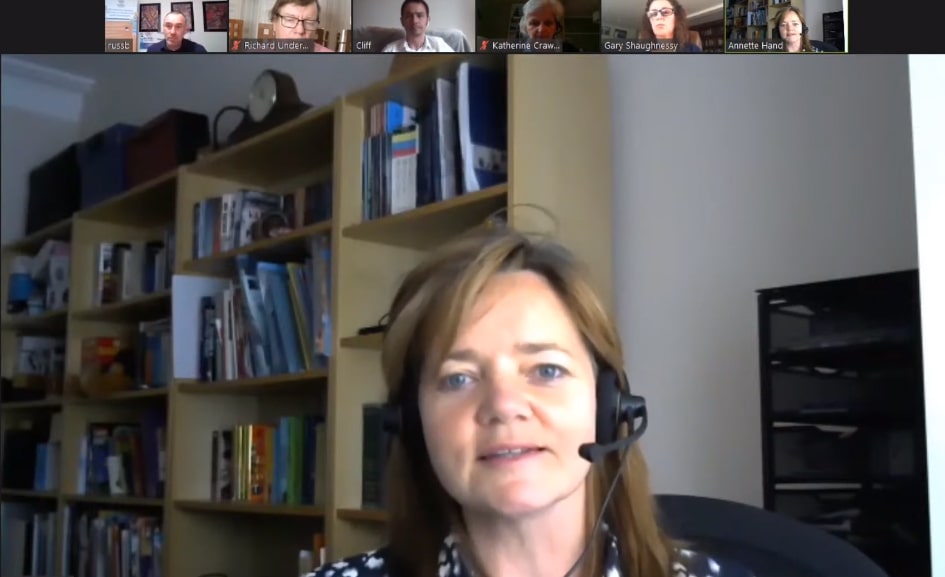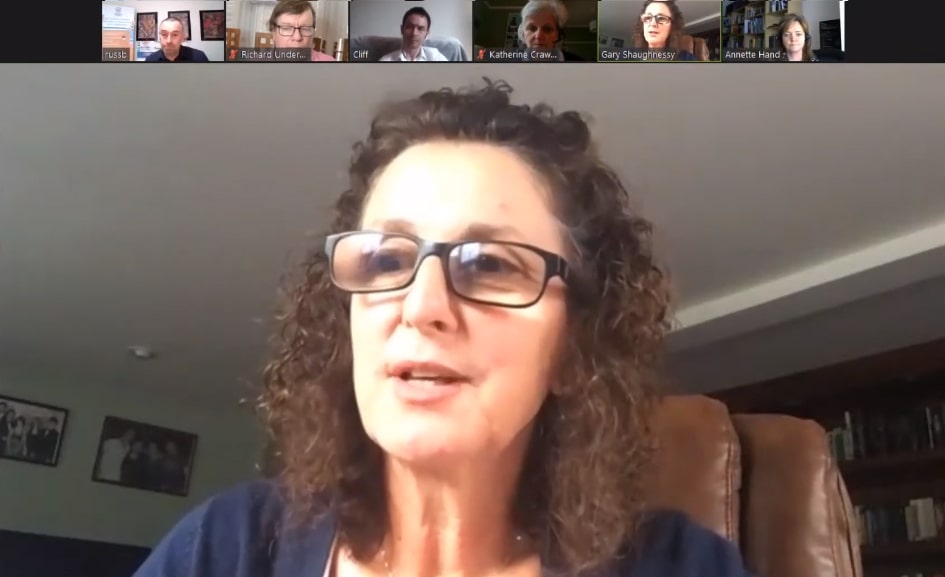A diagnosis of Parkinson’s may invoke a range of emotions. We at Charco Neurotech aim to improve the quality of life for people living with Parkinson’s and those around them, and we understand that greater knowledge of the condition and discovering the experience of others is beneficial for this.
Following a Parkinson’s Concierge and Parkinson’s UK webinar on the subject, we hope to alleviate some concerns that those newly diagnosed may have by sharing information from doctors, nurses, and people living with the condition.
Delays to Diagnosis
Dr. Annette Hand acknowledges that unfortunately, it’s quite common to hear stories of it taking a long time before people are correctly diagnosed. There are guidelines for GPs to follow in referring people as soon as they present with symptoms, but a lot of the early symptoms can sound like a number of other conditions. When we asked people on Twitter how they felt when they were first diagnosed with Parkinson’s we received many responses with the word ‘relief’, with people adding that it was good to finally know what was going on and have someone acknowledge their struggles. “When you have symptoms and no explanations it can be difficult to deal with. That’s why it’s easier when you are told what is wrong. Clarity is needed.”

We also received responses from people who were wrongly diagnosed due to their age. Although eventually correctly diagnosed, one man told us that when he asked if he might have Parkinson’s, his GP said, “Far too young for that”.
If you feel that something is not right, Dr Hand says it’s important to go back to your GP. Ensure that the professional you are referred to is a specialist in Parkinson’s, and you may then be able to use the NHS e-referral service to choose which hospital you would like to attend. If you have concerns about your diagnosis, you can contact Parkinson’s UK on their helpline, 0808 800 0303.
A Diagnosis of Parkinson’s During the COVID-19 Pandemic
Prior to COVID-19, Dr Hand says you could have been waiting 5 months to see a specialist. Now, the use of video consultations has reduced wait times in some instances to just one week. While it is still urgent to see some people face-to-face, it is possible to give a diagnosis of Parkinson’s through a video consultation. For more information on Parkinson’s and COVID-19, read our blog post here.
What Provision is Available Dollowing a Parkinson’s Diagnosis?
A diagnosis of Parkinson’s will be made in different ways for different people; scans include an MRI or CT to look for abnormalities in the brain, or a DAT scan to assess dopamine levels. Alone, the scans do not provide the whole picture.
Once diagnosed with Parkinson’s, referral should take a multi-disciplinary approach; there should be access to a specialist consultant, a nurse specialist, physiotherapist, occupational therapist and other health professionals that you need to help support and manage your condition. Dr Hand says that she often prioritises a referral to a physiotherapist, as many people have had Parkinson’s symptoms for years before their diagnosis and so will have picked up bad habits for walking and standing. She adds, “What I don’t want to do is tell someone they need to see ‘x, y, and z’ right at the start as it can be overwhelming; it’s about knowing what is available and what support there is”.
Parkinson’s UK has a list of the types of healthcare professionals you could be referred to. Unfortunately, not every area in the UK can provide equal services. You can help to address this by taking part in the USP project, which is a survey for people affected by Parkinson’s, by diagnosis or as family members. The survey will assess the scope and value of Parkinson’s nurses, which will help drive improvements.
Overcoming Feelings of Fear When Newly Diagnosed
One of the responses to our question on Twitter about how people felt after their diagnosis was, “Clueless. Misinformation and lack of information. Embarrassed. Scared and afraid.” Another was, “I was devastated, lost, and thought my life was over. I knew nothing about Parkinson’s before my diagnosis.” Richard Underwood, a person with Parkinson’s, advised that you should empower yourself through knowledge. Parkinson’s UK has lots of information on the condition, including a practical To Do list for those newly diagnosed, on their website.

Richard’s recommendation is to “get out there and meet people. Not just people with Parkinson’s, but also your friends”. He emphasises that you shouldn’t feel embarrassed or guilty. If you can, try to join a local support group that Parkinson’s UK run, or an online group. Parkinson’s UK are also currently developing a new support service called Parkinson’s Connect. It will be available for people with Parkinson’s as well as their friends, family and carers.
An excellent piece of advice that Richard shares is something that he was told when he was first diagnosed: “Don’t look in your past because in your past is where your guilt lies; the things you used to be able to do and possibly can’t do now. You have to put those things aside. Don’t look in the future, because that’s where all your anxieties are; what you think you may become but you may never. I was always told to look at today, to wake up tomorrow and to try to strive to do something slightly better than you did yesterday. I have superpowers; I can run, I can skip sideways and I can run backwards, but I’ll tell you what I can’t do is to walk forwards very well. But that doesn’t matter, because every day I strive to do a little thing a bit better.”
Dr Cliff Chen acknowledges that many newly diagnosed people may feel anxious when going somewhere for the first time or meeting new people. He tells us that there are two key drivers for anxiety: worry and avoidance. Worry is the questions: will I be able to cope? will I get there on time? will people judge me? Avoidance serves to relieve the symptoms of anxiety; you withdraw and avoid the stimulus, feeling relief and therefore learning that the way to deal with worry must be to withdraw. Echoing Richard’s advice he tells us that it’s actually important to push yourself. “When you get out there and experience it, it’s often not as bad as we thought”. To do this, relaxation exercises can help to settle the physiology as well as focus the mind on something else besides the worry. Dr Chen says you have to practise this when you’re calm: “This is a skill not a pill. You get good at it then put it to the test”. Once you’re good at the relaxation you can gradually expose yourself to more anxiety-provoking situations in a stepped fashion. “If you treat it like that you can overcome the anxiety”.
The Benefit of Creativity and Exercise
Dr Chen explains that creative activities can be beneficial for people with Parkinson’s. It can relax us, take our mind off the worries, and create something, providing a sense of achievement. Using art, it’s possible to work through some difficult thoughts and feelings by channelling them into something creative and turning it into something positive. “Sometimes I have to say to people, you’re working very hard to get the most from your treatment, but what have you done today that will bring you joy and contentment and a sense of peace and connection to others? Because today won’t come again.”
Richard also stresses that he finds vigorous exercise useful, whether it’s gardening, boxing, or simply dancing around the kitchen. Dr Hand adds that exercise and physiotherapy is important not only in helping you feel good, but also in slowing down disease progression.
Advice for People Diagnosed with Young Onset Parkinson’s (YOPD)
Parkinson’s is generally seen as a condition which only affects older people. Because of this, people with young onset Parkinson’s may struggle with their diagnosis, in addition to facing challenges associated with loss of employment. Dr Chen tells us that there is also some research to suggest that people with young onset Parkinson’s may suffer from additional mental health problems.
It is important to remember that you are not alone. Parkinson’s UK has a page dedicated to young onset Parkinson’s, with information about local support groups specifically for younger people.
Supporting those who Support People with Parkinson’s

Dr Chen mentions that often a psychologist will not need to be offered following a new diagnosis, as “there’s a huge amount to be done just by connecting with family and friends”. However, Russ Bradford, Co-founder of Parkinson’s Concierge and a person with Parkinson’s himself, acknowledges that it is quite often worse for the person providing support than it is for the person living with Parkinson’s, as they watch the person they love lose ability. Parkinson’s UK has a page for people who care for someone with Parkinson’s, including information on caring while in paid employment and a carer’s guide with practical advice.
Supporting someone with Parkinson’s can sometimes put tension on the relationship. Dr Chen stresses that you should “take Parkinson’s off the table and come together in an activity that doesn’t put it between you, like you used to in the old times. It means you do not become carer and patient and can instead maintain roles like husband and wife, that otherwise get eroded over time”.
It’s also important that you advocate for time for yourself. Although it is common to feel guilt in taking respite, Dr Chen likens the situation to that on an aeroplane, when you’re told that in the event of an emergency you should put your own oxygen mask on before someone else’s. “If you’re out you can’t help anyone else either; it’s far from selfish to look after yourself too as you are also looking after others”.
Thank you to the speakers, Parkinson’s UK and Parkinson’s Concierge for organising this helpful webinar and everyone who has shared their experiences.
Stay up-to-date with our progress and be the first to know when CUE1 is available and on sale! We’ll also send you an introductory offer as well as further information on our research progress and testing recruitment.